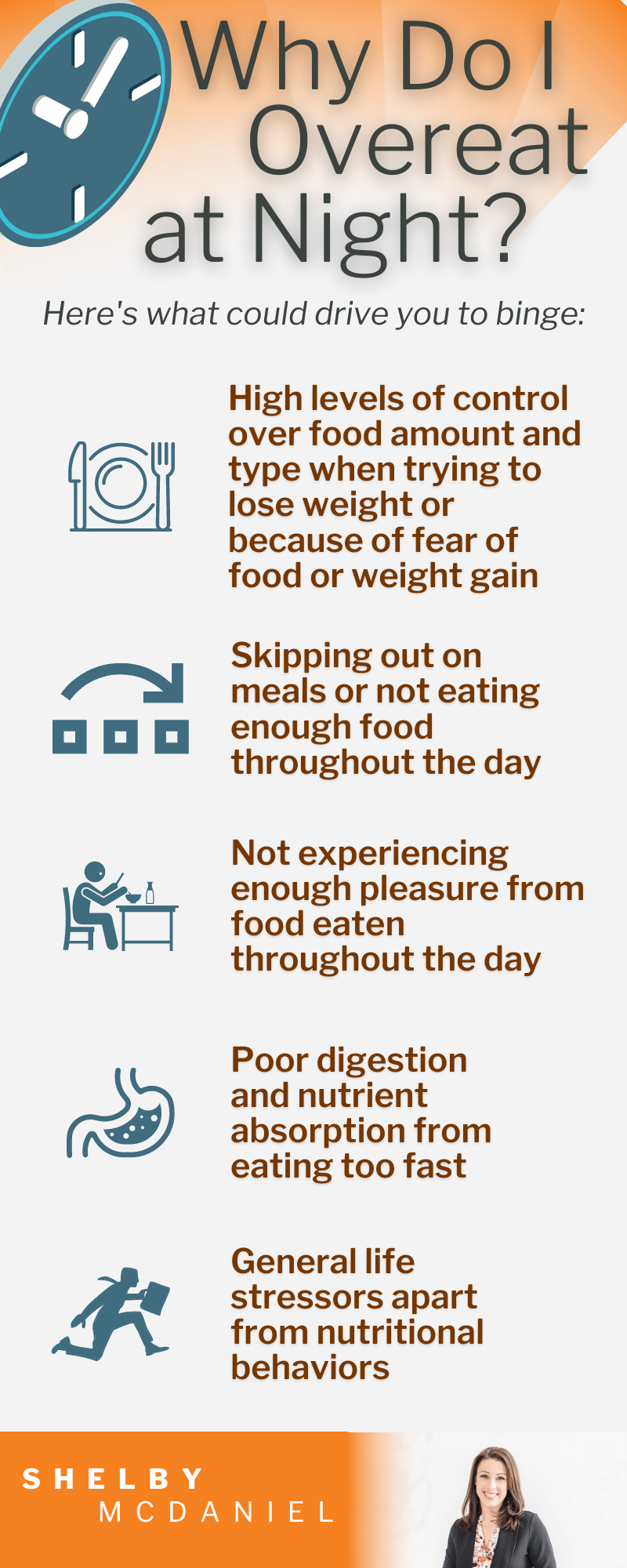How to stop binge eating at night is a popular topic for my clients and I. They know it’s happening, they know they “shouldn’t” be doing it, but binge eating seems to have power over them. I even have clients tell me, “Shelby, I’m an intelligent person. I don’t understand why I can’t stop this!” It is extremely frustrating, shameful, confusing, and sometimes physically painful.
Why Do I Binge Eat at Night?
Let’s get clarity on if you are overeating or if you are truly binge eating at night as these are two different behaviors. Simply put,
Binge Eating Is an Industrial-Strength Overeating Episode
The biggest difference between overeating and binge eating is the power and energy behind the binge. Binge eating is often associated with the term “compulsive eating” because it feels more powerful than us and often overpowers us. It is a NEGATIVE energy.
A true binge derives from a physiological stress response caused by factors in either the a) nutritional domain or b) personal domain. No one sits on the couch, happily watching movies, and says, “I think I’ll binge!”. Sure one can get lost on the couch, watching movies, and mindlessly overeat. But a binge is a whole other story.
When your body is in a physiologic stress response, it instinctually enters a fight, flight, or freeze response, but it can also enter what’s called a feed response.
When your physiology senses that your life is being threatened by not enough food, food restriction, macronutrient imbalance, lack of pleasure or experience of eating — the brain DRIVES you to eat. Binge eating is literally a survival urge, not a lack of willpower.
When your physiology senses stress derived from your personal world (work, money, relationships, etc), the brain again can DRIVE you to eat (feed response) because it learns over time if you eat enough food, at some point after the binge the body MUST relax in order to digest the food we just consumed. Eating enough food will then eventually drive your body into the physiological relaxation response.
As painful as out-of-body binge eating experience can be, it always has a brilliant reason for its existence and why a true binge is seen as compulsive due to your body’s stress response serving as a balancing act for a place in life where we are in “tight control”…
What could be driving your binge eating at night, or any time for that matter?
Food Control
When trying to lose weight or while living our fears of food and weight gain, we have a high level of control over our food amount,

type, and pleasure. This can lead to nutrient deficiency, calorie deficiency, blood sugar deregulation, brain chemistry imbalance, and ravenous hunger, which activates the stress response and can lead to binge eating to ensure you eat and survive. Binge eating here is simply a necessary nutritional correction.
Meal Frequency & Not Eating Enough
Artificially skipping meals because of fear of food, fear of hunger, fear of weight gain, or lack of interest in eating can oftentimes cause overeating or binge eating later in the day. Skipping meals can activate the stress response because the brain and body will not be denied. The body has a bio-circadian nutrition rhythm, just like it has sleep and heartbeat circadian rhythms. When your meal frequency is arhythmic, your body can become stressed and provoke binge eating to secure your survival. In our minds, however, we think there’s something wrong with us because we can’t control our appetite. But the reality is simple: we skipped meals or did not eat enough in the first half of your day, and your body is demanding more food and more nutrition (at night).
Zero Pleasure
Food is literally designed to give us this psycho-physiological need called pleasure. Why? So you eat and don’t die. Period. Therefor, to survive, pleasure from food is required for our brain and body. If we miss the experience of taste, pleasure, satisfaction, etc. — the brain interprets this missed experience as HUNGER. In other words, if you rushed through a meal and failed to notice it for whatever your reason, the brain isn’t smart enough to say, “Hey, you were in a rush and not paying attention to your food.” The brain simply says, “Hungry.”
We are literally physiologically driven to eat more, even if we’ve eaten a huge meal. The brain commands us to eat if it doesn’t get what it needs — the eating experience.
Eating Speed
The simple act of eating fast is considered a stressor by the body. If we were hunter-gatherers and eating extremely fast, the brain interprets this once again as “something’s wrong!” and goes on full alert. Therefore when you eat fast, you naturally digest and absorb nutrients poorly, resulting in lack of pleasure AND nutrient assimilation in a meal. So once again, the brain will primitively call for more food, another simple and necessary nutritional correction.
Life Stress
We can binge eat because of a buildup of:
- Anger
- Resentment
- Disappointment
- Worry
- Fear
- Judgment
- Blame
- Feeling abused
- Loneliness
- Confusion
- Unexpressed sexuality
- A past experience of sexual abuse
- An undelivered communication
- Unspoken truth
- Any past hurt
- A break-up
- A loss
- Grieving
- Letting go of something or someone
- Not living up to our own standards
- Perfectionism
- And more…
Remember, when stressed, the body can enter a fight, flight, freeze, OR feed response because binge eating is an “out of control” behavior, which is a balancing act for a place in life where we’re in “tight control.” If this place of tight control is in your work, relationships, finances, or other, and we aren’t finding alternative balancing acts to help you relax and step out of the stress response, binge eating can fulfill this role.
How To Stop Binge Eating at Night:
Here are my top recommendations for how to stop binge eating at night:
- Focus on shifting your eating intentions to be more like a pendulum versus a yo-yo. Meaning, instead of operating at a high-level food control of “all-out” or “black or white,” “good vs. bad” with your eating, approach your eating to be more like a clock pendulum, where the arc of your pendulum is small and swaying softly from side to side. For example, instead of cutting sugar 100% with no exceptions or you fail and fall off the wagon 100% (yo-yo), try finding a softer arc in your eating by setting goals such as reducing your sugar by 85% vs. 100%, so your eating behaviors reduce in extremes and have a higher chance of growing into healthy, sustainable habits.
- Be intentional about setting time aside to eat to reduce nutrient-deficient driven binge eating episodes.
- Enjoy what you eat. Aim to feel good after the meal then before you started, rather than stressing about being good. Remember, pleasure is innate and a necessary nutritional requirement!
- Take some deep breaths before eating. Try to create a calm space where you focus on your meal, your senses, yourself, and enjoy the eating experience. Shut off the phone, work email, or other distractions when possible.
- Take small moments for yourself every day to slow down. 5-10 minutes here and there throughout the day to say YES to you can have a profound positive impact on your stress levels and reduce the risk of binge eating.
- Where else do you need to loosen your grip or stop trying to juggle 50,000 balls in the air? Where can I delegate? Who can I ask for help? What do I need to improve with my time management? Where do I need to set boundaries or say no to? What is something joyful outside of eating that I could do for myself this week to help my body and mind relax?
In Closing:
Binge eating at night (or any time for that matter) is NOT a will power issue — rather, it’s an amazing strategy of the body. Binge eating gets our attention in a BIG way. It is asking you to dig deeper, ask good questions, explore nutritional and emotional dimensions, get real with ourselves, and perhaps face your fears. Sometimes it can be complex, other times simple in solution and can be worked with, listened to, and transformed without the use of pharmaceuticals.
What is it that your binge eating might be trying to tell you? The reveal of a negative power such as binge eating means there is POSITIVE power calling to be unleashed. If you need help understanding your binge eating and transforming its power back into your life, we are here for you! When it comes to ourselves, it is always the hardest work because we are in deep with the struggle. Please book a Breakthrough Clarity Call if you are ready to free yourself from binge eating for good.
*Institute for the Psychology of Eating. Modules 01 & 03, 2021


